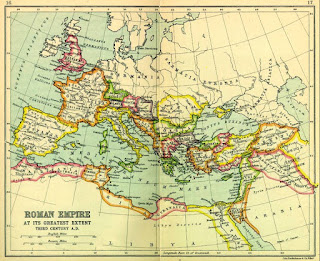 |
| A version of Matteo Ricci's map created at the request of Wanli Emperor |
Think how humanity spread across the globe many thousands of years ago, long before the existence of Sumer and Ancient Egypt without any possibility of communicating between distant settlements. A look at the history of China and Europe is enough to exemplify the importance nature and geography had on our development. European culture is much more diverse than Chinese which anyway is regarded as one single civilization even if it had its own share of internal struggles. During antiquity and most part of the Middle Ages, Europe was a vast forest which meant that traveling was an adventure not many felt comfortable in embracing. China was mostly the opposite, great plains and the discovery of rice fostered a large population of mostly settled as opposed to migratory workers.
 |
| A typical human migration map, courtesy of Wikipedia. |
 |
| Roman Empire at its greatest extent, courtesy of University of Calgary. |
Nothing new you could say, in which case you agree with me (and those who stand as a foundation), in fact, most good and real things are not new. Antiquity discovered many basic principles but because of the limits in technology these remained in the realms of philosophy and theory. Even now science is filled with theories waiting for someone in the future to prove them right or wrong. I strongly believe humanity has a chance to unite once again, embracing the differences just like in a large family you can find totally different individuals sitting at the same table during Christmas, Ramadan or any other occasion.
I recommend you read one of my older articles entitled Making a Bigger Tribe in order to get a better overall image about this issue.


No comments:
Post a Comment